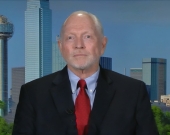Professor Jim Sperling for Gulan: There is a general dissatisfaction with the exercise of American power within the United States
January 17, 2019
Exclusive Interviews

Jim Sperling is professor of political science at the University of Akron. He has taught at Akron since 1988. Prior to that time he held appointments at Davidson College and the James Madison College, Michigan State University. He teaches World Politics and Government (the introductory course to comparative politics and international relations), International Politics and Institutions, and Comparative Security Policy. His publications have explored various facets of German foreign economic and security policy over the course of the postwar period as well as the problem of the new security agenda, global security multilateralism, and regional security governance in the contemporary international system. His publications include the coauthored NATO’s Trajectory into the 21st Century (Palgrave 2012) and EU Security Governance (Manchester University Press 2007) and the coedited NATO after Sixty Years (Kent State University Press), National Security Cultures: Patterns of Global Governance (Routledge 2010), European Security Governance: The European Union in a Westphalian World (Routledge 2009), and Global Security Governance (Routledge 2009). He is editor of Handbook on Governance and Security (Edward Elgar 2014) and is currently coauthoring with Mark Webber NATO: What’s wrong with it? How to fix it? (Polity Press). In a written interview he answered our questions as the following:Gulan: How do you characterize the current state of world affairs? Are we ushering into a new cold war? Or are witnessing the coming back of rivalry between great global powers?
- Professor Jim Sperling: There is a general dissatisfaction with the exercise of American power within the United States. Americans in the foreign policy community believe that American power has been squandered in the service of questionable goals (democratization via the barrel of a gun) and in wars of choice (Iraq and Afghanistan after 2003). There is also dissatisfaction with the exercise of American power in regions considered to be the historical zones of influence of rising powers (notably Russia and China). I’m not sure what the final form of the great power competition will take, but it will certainly be shaped by overlapping and diverging interests of the states in the Indo-Pacific region broadly conceived.
Gulan: To what extent the international and multilateral institutions have been called into question due to Trump’s administration foreign policy?
- Professor Jim Sperling: There is no doubt that Trump has sought to erode those institutions, but the current Administration’s efforts to undermine those institutions is likely to fail owing to the realization by other states in the international community of how important they are. I suppose that is the good news.
Gulan: What is your opinion about employing economic coercion by Trump’s administration for achieving its foreign policy goals?
- Professor Jim Sperling: Those policies cannot be taken as a single ‘policy’ since the targets of US policy differ in terms of the nature of the grievance and the counterpart. The economic coercion vis-à-vis Mexico, Canada, EU and Japan is counterproductive in every respect. The tariffs on Chinese goods remains an open question; if it yields greater transparency and better protection of intellectual property rights and other asymmetries that the Chinese have exploited, then they will serve a purpose. The question that can’t be answered is whether there is any strategy behind the tariffs or is the Trump White House practicing a naïve mercantilism.
Gulan: How do you envision the future role of European Union in addressing global challenges, especially security ones? Especially there is widening gap between EU and USA with regard to many significant challenges, for example, the Iranian Nuclear Program?
- Professor Jim Sperling: Most would like to see the EU take a more pronounced role in the international system as a brake on US excess. But at the same time the EU is sufficiently divided internally, particularly on the use of military force and coercion generally. As a consequence, its role is likely to be restricted to mediating conflicts where both parties want a solution to emerge but require an external honest broker.
Gulan: Do you expect that the divergence perspectives between EU and USA, will lead to serious rapture between them? Or at least the US foreign policies will eventually and inevitably trigger countermeasures by EU?
- Professor Jim Sperling: There have been ruptures between the Europeans and US since the founding of NATO. The current conflict between Europe and the US presently has more to do with Trump than with the divergence of interests. If the Republican party adopts a Trumpian foreign policy post-Trump and if it retains a majority in the Congress, then it will be increasingly difficult to avoid some sort of permanent rupture.
Gulan: Mr. Trump’s statement about obsolescence of NATO triggered considerable controversies, how do you seen the future of this organization?
- Professor Jim Sperling: NATO will be fine into the future. It fulfills too important a role and aside from a few individuals in the White House, there is no doubt among the American foreign policy elite that NATO is the foundation of US security and global order.
Gulan: Do you believe Germany -as a powerful economic powerhouse- should play an increasingly global role?
- Professor Jim Sperling: Germany already does so, but primarily as a member of the EU. I’m not sure what Germany could actually do alone—it has no military capabilities that would allow it conduct an expeditionary operation alone (and it has no desire to do so)—and there is no real desire for Germany to act outside multilateral frameworks.















